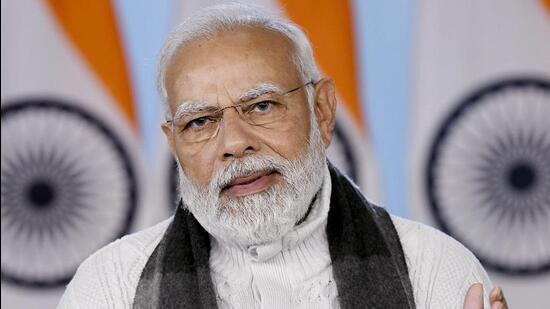‘Propaganda’: MEA rejects BBC documentary on Modi
UK Prime Minister Rishi Sunak, too, said in the country’s parliament that he “doesn’t agree with the characterisation” of his Indian counterpart in the series.
India on Thursday dismissed a BBC documentary on Prime Minister Narendra Modi’s role during the 2002 Gujarat riots as “propaganda”, with the external affairs ministry saying the film reflected bias and a colonial mindset.

UK Prime Minister Rishi Sunak, too, said in the country’s parliament that he “doesn’t agree with the characterisation” of his Indian counterpart in the series.
The documentary, India: The Modi Question, has generated controversy since the first part of the series aired in the UK on January 17. BBC has described the two-part documentary as a look at the “troubled relationship” between the Indian government and the Muslim minority following Modi’s re-election in 2019.
Responding to a question about the documentary at the weekly media briefing, external affairs ministry spokesperson Arindam Bagchi noted the film has not been screened in India and is not legally available on social media or streaming platforms. He also questioned the timing of the release of the film and the “agenda” behind it.
“I am only going to comment in the context of what I have heard about it and what my colleagues have seen. Let me just make it very clear that we think this is a propaganda piece designed to push a particular discredited narrative,” Bagchi said.
“The bias, the lack of objectivity and frankly, a continuing colonial mindset is blatantly visible. If anything, this film or documentary is a reflection on the agency and individuals that are peddling this narrative again.”
Bagchi added: “It makes us wonder about the purpose of this exercise and the agenda behind it and frankly we do not wish to dignify such efforts.”
In UK’s House of Commons, when asked about the documentary by Pakistan-origin MP Imran Hussain, Sunak said: “The UK government’s position on this has been clear and long-standing and hasn’t changed. Of course, we don’t tolerate persecution where it appears anywhere but I am not sure I agree at all with the characterisation that the honourable gentleman has put forward to.”
Also Read | BBC documentary row: Rishi Sunak defends PM, snubs Pak-origin MP
Bagchi also addressed comments by former UK foreign secretary Jack Straw in documentary, saying the former minister was ostensibly referring to an internal report. “How do I have access to that? It is a 20-year-old report. Why would I just jump on it now? Just because Jack Straw says it, how do they lend it that much legitimacy?” Bagchi asked.
“I heard words like inquiry and investigation. There is a reason why we used the words colonial mindset. We do not use words loosely. What inquiry?” he said.
Referring to the reported investigation by British officials into the Gujarat violence, he said, “Are they ruling the country? I do not agree with that characterisation.”
Modi has denied accusations of failing to stop the riots when he was chief minister of Gujarat in 2002. A Supreme Court-appointed probe found no evidence of wrongdoing by him. A special investigation team, in a report submitted a decade after the riots, also exonerated him, saying there was “no prosecutable evidence”. In June 2022, the Supreme Court dismissed a petition questioning his exoneration, saying the case was “devoid of merits” and had been filed for “ulterior design”.
Lawmakers in the UK have taken up with their government the death of a few British citizens of Indian origin in the 2002 violence. Responding to another question on this issue, Bagchi said India has its own legal procedures for dealing with such deaths. “Whether they took up [the deaths] in 2002, I do not have an idea,” he said.
The sectarian riots of 2002 left more than 1,000 people dead, most of them Muslims. The violence began after a Muslim mob set fire to a train carrying Hindu pilgrims, killing 59.
BBC responded to Bagchi’s remarks in a statement that said: “The documentary was rigorously researched according to highest editorial standards.”
The BBC added, “A wide range of voices, witnesses and experts were approached, and we have featured a range of opinions – this includes responses from people in the BJP. We offered the Indian government a right to reply to the matters raised in the series – it declined to respond.”
According to BBC, the second part of the series, to be aired in the UK on January 24, will focus on the track record of Modi’s government following his re-election in 2019, including the removal of Jammu & Kashmir’s special status and the Citizenship (Amendment) Act.
BJP general secretary CT Ravi hit out at the BBC documentary, stating that their approval wasn’t needed. “Who in their right mind would ever think of believing the propaganda machine called the BBC,” he tweeted.





